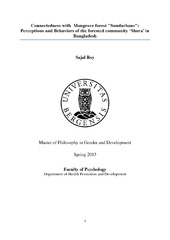Connectedness with Mangrove forest "Sundarbans": Perceptions and Behaviors of the forested community 'Shora' in Bangladesh
Master thesis
Permanent lenke
https://hdl.handle.net/1956/7331Utgivelsesdato
2013-05-31Metadata
Vis full innførselSamlinger
Sammendrag
The recurrence of environmental calamities is causing the degradation of the Sundarbans' forest in Bangladesh. The thesis aims to discover the forest societies' perceptions and behaviors about the Sundarbans,' considering the before and after dimensions of the cyclones Sidr' and Aila' which occurred in the coastal district of Satkhira' located adjacent to the Bay of Bengal. The study predominantly focuses on the forest dependents' women and men in the village, Shora, as the scope of the study. By employing a qualitative research method combining with observation, in-depth interview and Focused Group Discussion, the present study critically investigates the women's and men's detailed perceptions about the forest, its resources, and how their perceptions and interactions in the use of forest resources have been affected due to Sidr and Aila. In addition, the study documents the area inhabitants' notions around environmental security as it relates to the Sundarbans and their region. The study explores that the area inhabitants get acquainted with the forest from their childhood through story-telling narrated by the senior family members and the elderly Murubee,' and the lessons taught at the primary school. Although the forest goers follow myths for going to the Sundarbans, the study finds that, compared to the women of Shora, the men act in a bolder manner, and gets an access to the dense part of the forest throughout the years, hoping to get handsome cash income. The study reveals that in the pre-cyclone landscape, a few ultra-poor married women, widow and divorced women would enter to the nearest part of the forest to sustain their livelihood. It is evident that women, rather than men, glean the forested resources in a sustainable way, but due to patriarchal attitudes, as well as conservative Muslim outlook towards women, they earn little benefit from the forest resources, and their access to market is confined. Furthermore, the study observes that people consider Sundarbans a great source of oxygen; a provider of human security components; and at the same time resistant of natural disasters. The findings suggest that in the post cyclone context, a lot of women are challenging the so-called local customs' and are engaged in income generating activities outside of home and in the forest. It also confirms that disaster-victims are looking forward to having an alternative source of income, so that the forest might be protected from human intervention.
